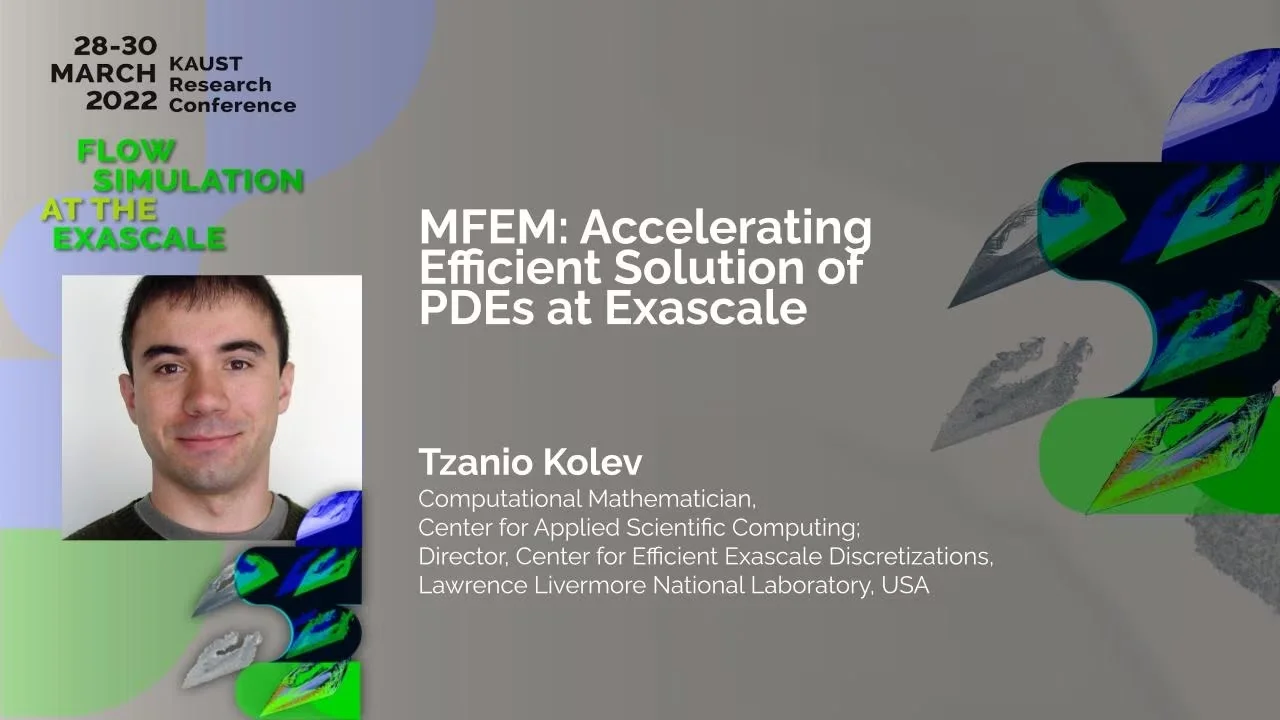
MFEM: Accelerating Efficient Solution of PDEs at Exascale
- Tzanio Kolev, Center for Applied Scientific Computing, Director of the Center for Efficient Exascale Discretizations, Lawrence Livermore National Laboratory, USA
KAUST Library
Upcoming exascale architectures require rethinking of the numerical algorithms used in large-scale PDE-based applications. These architectures favor algorithms, such as high-order finite elements, that expose fine-grain parallelism and maximize the ratio of floating point operations to energy intensive data movement. In this talk we present an overview of MFEM [1], a scalable library for high-order finite element discretization of PDEs on general unstructured grids. We also report on recent work in the Center for Efficient Exascale Discretizations [2], a co-design center in the US Exascale Computing Project focused on next-generation discretization software and algorithms. Our approach to efficient operator evaluation is based on a "matrix-free" representation of the finite element operator, that factors a bilinear form into a series of sparse and dense components corresponding to the parallelism, mesh topology, basis, geometry, and pointwise physics in the problem. The operator decomposition exposes several layers of parallelism, enables the use of batched dgemss and tensor contractions, and only requires quadrature point values to be assembled for computing the action. This "partial assembly" formulation is a natural fit for modern HPC hardware, because it results both in less (nearly optimal) computation and less (optimal) data movement compared to assembling a global sparse matrix, therefore increasing performance and reducing time to solution. In addition to discussing efficient operator evaluation, we will provide an overview of the MFEM capabilities and applications to compressible hydrodynamics and electromagnetics. We will also review our work on performance optimizations for GPU architectures, high-order benchmarks and miniapps, scalable unstructured adaptive mesh refinement, high-order mesh optimization and matrix-free preconditioning. [1] MFEM: Modular finite element library, http://mfem.org. [2] Center for Efficient Exascale Discretizations, http://ceed.exascaleproject.org.
Overview
Abstract
Upcoming exascale architectures require rethinking of the numerical algorithms used in large-scale PDE-based applications. These architectures favor algorithms, such as high-order finite elements, that expose fine-grain parallelism and maximize the ratio of floating point operations to energy intensive data movement.
In this talk we present an overview of MFEM [1], a scalable library for high-order finite element discretization of PDEs on general unstructured grids. We also report on recent work in the Center for Efficient Exascale Discretizations [2], a co-design center in the US Exascale Computing Project focused on next-generation discretization software and algorithms.
Our approach to efficient operator evaluation is based on a "matrix-free" representation of the finite element operator, that factors a bilinear form into a series of sparse and dense components corresponding to the parallelism, mesh topology, basis, geometry, and pointwise physics in the problem. The operator decomposition exposes several layers of parallelism, enables the use of batched dgemss and tensor contractions, and only requires quadrature point values to be assembled for computing the action. This "partial assembly" formulation is a natural fit for modern HPC hardware, because it results both in less (nearly optimal) computation and less (optimal) data movement compared to assembling a global sparse matrix, therefore increasing performance and reducing time to solution.
In addition to discussing efficient operator evaluation, we will provide an overview of the MFEM capabilities and applications to compressible hydrodynamics and electromagnetics. We will also review our work on performance optimizations for GPU architectures, high-order benchmarks and miniapps, scalable unstructured adaptive mesh refinement, high-order mesh optimization and matrix-free preconditioning.
[1] MFEM: Modular finite element library, http://mfem.org.
[2] Center for Efficient Exascale Discretizations, http://ceed.exascaleproject.org.
Brief Biography
Tzanio Kolev is a computational mathematician at the Center for Applied Scientific Computing of Lawrence Livermore National Laboratory (LLNL) where he works on efficient finite element discretizations and solvers for problems in compressible shock hydrodynamics, multi-material ALE, computational electromagnetics and other application areas. He joined LLNL in 2004 after earning a Ph.D. in Mathematics from Texas A&M University. Tzanio is the director of the Center for Efficient Exascale Discretizations (CEED) in the Exascale Computing Project and the project leader of several projects at LLNL, including MFEM, BLAST and ETHOS. Tzanio’s research interests include the development and analysis of finite element discretizations, high-order methods and applications, performance optimizations and scalability, discretization-enhanced multigrid solvers, and the design and implementation of large-scale scientific software.
